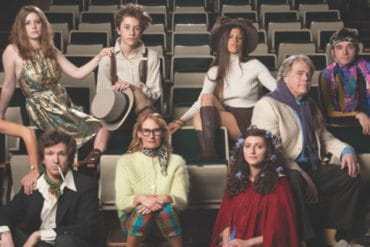The life and tunes of Charles Goldstuck.
Born and brought up on a rural farm in South Africa where he had just a single radio with only a few stations, Charles Goldstuck has followed an improbable path to the top of the music world. Having partnered with music legends Clive Davis and L.A. Reid, Goldstuck has guided the careers of some of the country’s top musicians, most recently through his company Hitco Entertainment.
 On an island filled with Fortune 500 CEOs, there is little representation from the entertainment world, particularly compared with Martha’s Vineyard, which is known for its affinity toward Hollywood. Yet Goldstuck is not your typical flashy entertainment mogul. He takes a highly disciplined and corporate approach to the music industry, which he attributes to his success and longevity in what is otherwise a highly unpredictable business. N Magazine sat down with Charles Goldstuck to learn more about his path to the pinnacles of the music industry.
On an island filled with Fortune 500 CEOs, there is little representation from the entertainment world, particularly compared with Martha’s Vineyard, which is known for its affinity toward Hollywood. Yet Goldstuck is not your typical flashy entertainment mogul. He takes a highly disciplined and corporate approach to the music industry, which he attributes to his success and longevity in what is otherwise a highly unpredictable business. N Magazine sat down with Charles Goldstuck to learn more about his path to the pinnacles of the music industry.
N MAGAZINE: Achieving your level of success in the music industry would be extraordinary for just about anybody, but you came from some unique circumstances that make your career especially unlikely.
GOLDSTUCK: I grew up in the middle part of South Africa in a farming community in the Orange Free State, which was the smallest of the four provinces at that time. It was a very, very conservative community. We were the only English-speaking family in a radius of forty miles. The South African Broadcasting Corporation controlled all of radio. It eventually expanded where the broadcast licenses opened up and we could listen to what I would call top forty radio on only one station. Apartheid was the rule of the land, and so musical coverage and exploration was limited. But people found a way of bringing records into the country. There was a network of people who would trade music so that we could explore different musical influences. Even though there was a limitation to what we were exposed to given the censorship, it only fueled my appetite to want to be more active in music and to have a seat at the table, even though at that time I didn’t know what that was.
N MAGAZINE: When you came to the United States in the eighties, how did you break into the music industry?
GOLDSTUCK: I was lucky, because I qualified as a chartered accountant in South Africa, which was the path you took if you wanted to go into business. So, I was able to get a job for my first three years with Ernst and Young where I worked on a lot of the music industry accounts, especially on the consulting side. That gave me the kick start to get into the music publishing arm of the Warner Music Group, which ultimately merged with Time. At Warner’s music publishing division, I was given the Latin division to run because no one else wanted it. I said, “Give me a chance to see if I can restructure and ride through the storm,” which I was able to do. That’s what really catapulted me into music: being willing to take on an assignment that no one else wanted, but for me it was a gift beyond any gift. And that’s how it began for me in America.
 N MAGAZINE: What is the skill set that you have that enables you to deal with people who may be a little more challenging to manage than in other professions?
N MAGAZINE: What is the skill set that you have that enables you to deal with people who may be a little more challenging to manage than in other professions?
GOLDSTUCK: My first foray into entertainment was promoting artists on campus while I was at university. What I realized very quickly was the ground rules that I’d established for how I lived my life and how I saw the world were completely different than those of these creators who generally see the world through the lens of their art. Artists are different than business people, but we all have the same passion, which is our love for music. So, I found that I really enjoyed the challenge of connecting the commercial side of the business with the creative side.
N MAGAZINE: And you did that exceptionally well.
GOLDSTUCK: The big reason for the successes that I’ve had is that I’ve always partnered with the best creative minds in the business. People like Clive Davis and L.A. Reid are some of the greatest hit makers of the modern era. I don’t go into the studio and make records—my partners generally oversee that—but as the creative comes out of the studio, I have to make sure that we can help our artists achieve their ambitions and help our businesses achieve the right commercial outcome. So, I’ve been able marry my entrepreneurial and commercial sensibilities very effectively with the creative needs of the business.
 N MAGAZINE: Let’s talk about Clive Davis, clearly one of the most legendary names in the record business. What made him so effective?
N MAGAZINE: Let’s talk about Clive Davis, clearly one of the most legendary names in the record business. What made him so effective?
GOLDSTUCK: In one regard, Clive and I were very similar. We were both determined to find the very best outcome that we could every single day that we showed up for work. Obviously, he was a generation ahead of me and had achieved enormous success by the time he and I came together in the late 1990s, but what I loved about Clive was that every day he acted like he hadn’t accomplished anything in his career. He felt like he had everything to prove. The bar was always raised very high. His attitude was almost that of somebody who was dying to succeed and who had not had his breakthrough, despite the fact that he’d had many over decades. I loved that enthusiasm and determination, because that played into my personality.
N MAGAZINE: Who were the biggest names in entertainment that you and he helped promote?
GOLDSTUCK: Alicia Keys is the artist whom I’m proudest of because of what we were able to accomplish right at the start of our partnership at J Records. She was this young nineteen-year-old virtuoso. She could play instruments, she could write, she could produce—I mean, she was the whole package. But at the time, no one knew who she was. She’d been signed to Columbia Records for a couple of years and they did not know what to do with her. Her career was going nowhere. When she came over to J Records, we were able to develop her. Alicia performed what was to become her first hit, “Fallin’,” on the Oprah Winfrey Show and everything just exploded from there. There were also others like Maroon 5 who came to us in a joint venture. They were known as Kara’s Flowers. We changed the name and worked long and hard on that first single of theirs, “Harder to Breathe,” which after about a year of us working on it finally connected. Twenty years later, Maroon 5 and Adam Levine are still considered one of the biggest artists globally.
N MAGAZINE: You also worked with some legendary established artists as well, correct?
GOLDSTUCK: Yes, we were able to help resurrect the careers of artists like Carlos Santana, who was in his fifties. At that time, he was considered to be an aging rock star. No one thought that he had a chance. And yet when his Supernatural album came out around the 1998–99 time period, it ended up winning eight Grammys and soon sold more albums than just about any other in history. So whether it was Carlos Santana, or Rod Stewart’s Great American Songbook Series, which became a massive success story, or revitalizing the career of Luther Vandross, who had pretty much faded from the scene until we brought him back—it wasn’t just about the new artists, it was also about some of the legendary, established artists that had a quiet period in their careers that we were able to revitalize.
 N MAGAZINE: Talk about your company today, Hitco Entertainment, and probably its most famous artist, Jennifer Lopez.
N MAGAZINE: Talk about your company today, Hitco Entertainment, and probably its most famous artist, Jennifer Lopez.
GOLDSTUCK: I partnered with L.A. Reid, whom Clive and I had competed against aggressively. Our career paths did not coincide until three years ago when he asked me if I was interested in partnering with him to launch a new business. L.A. and I launched Hitco with a view that we would operate in this new digital era and build a modern-era music company. We would add music publishing so we could represent songwriters and broaden the base of the business. Most of our signings have been focused on new artists like SAINt JHN, who had a huge breakthrough with one of the biggest songs of the summer. We also signed some established artists like Jennifer Lopez, who had worked with L.A. Reid at a number of other companies. Now, Jennifer obviously has a very, very successful film and TV career, which is where most of her time is spent, so we see our job is to help her amplify her activities in music.
N MAGAZINE: Have you brought any of these artists to Nantucket?
GOLDSTUCK: I have not. I’ve separated my business life from my family life. Our family has an understanding, informal as it is, that come summer when we’re on Nantucket, that’s family time. We have our dinners together every night, exercise together. That is really the only time that I can decompress and not prioritize my business, bluntly put, over my family. Nantucket for me has been a haven from the intensity of a business that doesn’t sleep.
 N MAGAZINE: How did you discover Nantucket?
N MAGAZINE: How did you discover Nantucket?
GOLDSTUCK: The early part of my life in America was on the West Coast. When I moved to the East Coast in 1998 to partner with Clive Davis, I was looking for a summer escape. I had just gotten into a serious relationship with my wife Karen and we were deciding on whether to go to the Hamptons or Nantucket. A lot of the people that I was getting to know on the East Coast kept telling me that I had to try Nantucket. My very first summer, we stayed at the Wauwinet and just loved every bit of the experience—other than the mosquito infestation that hit that summer. I’m a bit of a foodie and Nantucket is loaded with great restaurants, always has been. So, my love affair with Nantucket started over twenty years ago. When my kids were born, Nantucket just became part of our lives, which was cemented when we bought our house.
N MAGAZINE: The entertainment business and the recording industry are very well represented on “the other island,” but not on Nantucket. Why do you think Nantucket attracts a more corporate population while the Vineyard seems to be more entertainment-driven?
GOLDSTUCK: I think you have to go back thirty or forty years when people like Carly Simon bought a house on the Vineyard. There were many artists like her who liked the rustic, bohemian nature of what the Vineyard was in those days. Whereas Nantucket was much more about the banking and real estate world, as well as a haven for families that for generations have been coming to Nantucket. The creative set started to go to the Vineyard, and it just created a momentum of its own.
 N MAGAZINE: You were one of the early adopters of streaming services in the conventional record industry. How has streaming changed the music industry for musicians?
N MAGAZINE: You were one of the early adopters of streaming services in the conventional record industry. How has streaming changed the music industry for musicians?
GOLDSTUCK: There’s now an opportunity where anybody who is creative can record an album. They can do videos of their music and upload those onto services with such ease that there’s no barrier to entry other than how artists develop the right kind of audience that creates the consumption levels that ultimately allows them to earn a living.
N MAGAZINE: With that in mind, what advice would you give an aspiring musician starting out today?
GOLDSTUCK: For any new artist, you’ve got to be prolific in your output. You’ve got to constantly be putting out content to satisfy your audience. You can’t just put out a song and then hope that it connects. You’ve got to put out music and visuals, whether it’s videos or images. Then you’ve got to be very active on social media so that you can build an audience. Start local. When these venues open up again, perform in front of audiences and build your local following. If you can build a local audience, you can build a national or an international audience. But it requires complete commitment, because there are so many creators now who are active. It’s more competitive than it’s ever been, so it has to be your priority. You cannot want to be an artist while doing other things. You have to give it everything you’ve got because there are many who are doing that and if you don’t, you can’t be competitive.







